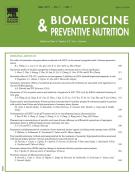Dimethoxycurcumin potentially protects arsenic induced oxidative hepatic injury, inflammation and apoptosis via Nrf2-Keap1 signaling in rats - 23/10/14

 , M. Muthumani
, M. MuthumaniAbstract |
NADPH oxidase mediated ROS generation plays a decisive role in the pathogenesis of arsenic (As) hepatotoxicity. Antioxidant phytochemicals, like dimethoxycurcumin (DiMC) has a tremendous scope in attenuating the ROS mediated hepatic injury. Hence, the present study has been designed to investigate the hepatoprotective action of DiMC by analysing the markers of hepatic oxidative stress, pro-inflammatory cytokines, apoptotic markers and antioxidant competence in As (5mg/kg BW) induced hepatotoxic rats. Oral administration of DiMC (80mg/kg BW) to As intoxicated rats showed a significant amelioration in the levels of serum hepatic markers, pro-inflammatory cytokines and the expression of NADPH oxidase subunits (Nox2, Nox4, and p47phox) in liver. The elevated levels of hepatic oxidative stress markers lipid peroxides, hydroperoxides, protein carbonyls and conjugated dienes and decreased levels of enzymatic and non-enzymatic antioxidants status were also reverted back to near normalcy by DiMC when compared with As treated rats. In addition, mRNA and protein expression analysis also confirms that DiMC pre-treatment significantly downregulates the NOX subunits and upregulates the Nrf2 and its related enzymes in the liver. Studies on the mechanism of apoptosis showed that As accelerated the markers of mitochondrial dependent apoptotic pathway (enhanced cytochrome c release in cytosol from mitochondria, altered the expression of Bax, Bcl-2, Bad, caspase-9, caspase-3). However, DiMC pre-treatment effectively restored the As-induced alterations in liver. Histological and immunohistochemical results were also evidenced that DiMC potentially protects the liver from As-induced oxidative stress, inflammation and apoptosis. These findings encourage the use of DiMC as a prospective salutary entity for As hepatotoxicty through the suppression of NADPH oxidase and Nrf2 activation.
Le texte complet de cet article est disponible en PDF.Keywords : Arsenic, ROS, Dimethoxycurcumin, NADPH oxidase, Apoptosis, Nrf2/Keap1 signaling
Plan
Vol 4 - N° 4
P. 561-577 - octobre 2014 Retour au numéroBienvenue sur EM-consulte, la référence des professionnels de santé.
L’accès au texte intégral de cet article nécessite un abonnement.
Déjà abonné à cette revue ?

